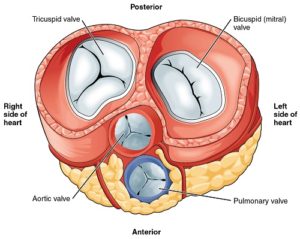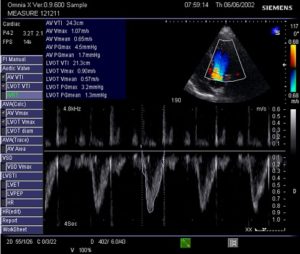In this Medical Monday series, we’re talking about how your doctor reaches a diagnosis of common conditions associated with coagulation. It may help if you first read the introduction, before reading about today’s topic of heart valve conditions. Altogether we’re covering
- Introduction
- DVT, Deep Vein Thrombosis
- Post-thrombotic syndrome
- PE, Pulmonary Embolism
- Pulmonary hypertension
- AF, Atrial Fibrillation
- Heart Valve conditions – aortic and mitral
- Thrombophilia
- Stroke
Introduction
 This picture of a cross-section across the heart shows your four heart valves.
This picture of a cross-section across the heart shows your four heart valves.
Diseases of the heart valves are reasonably common particularly in older people. Disease most commonly affects the aortic or mitral valves.
The mitral valve is the valve between the upper and lower chamber of the left side of the heart. In this post I will look at mitral valve disease. Problems with the mitral valve can be due to a leaking valve, called mitral regurgitation or narrowed valve, called mitral stenosis. Both mitral stenosis and regurgitation can develop after Rheumatic fever. This is usually a childhood illness and causes inflammation of the heart muscle and lining of the heart causing damage to the mitral valve which caiuses problems later in life. In most Western Countries Rheumatic fever is uncommon but New Zealand has a high incidence; the reason for this is unknown. As a results the incidence of mitral valve disease is higher in New Zealand than in many countries. this country than
Your story
 The symptoms of mitral valve disease are quite variable and can gradually creep up on you. In young patients there may be no symptoms but as the condition becomes more serious the following can occur
The symptoms of mitral valve disease are quite variable and can gradually creep up on you. In young patients there may be no symptoms but as the condition becomes more serious the following can occur
- cough
- shortness of breath (especially when you are lying down on your back or exercising)
- fatigue and tiredness
- lightheadedness
- an irregular or fast heart beat.
You may also feel pain or tightness in your chest. The symptoms tend to get worse under any kind of stress, such as exercise or illness. Young women with this condition can find pregnancy very difficult with quite severe symptoms. Severe mitral stenosis leads to an increased pressure in the heart which causes fluid to leak into the lungs causing the cough and breatlessness
Questions your doctor may ask
Your doctor will ask about your activity and and what brings on the symptoms. Breathlessness is one of the first symptoms with this condition and can be worse lying down, some people wake at night short of breath. A cough is common and it might be blood stained. If you are getting central chest pain your doctor will be concerned and will want you to have more investigations. Your doctor may already know that you have a problem with your heart valve. Mitral valve disease is often due to an earlier heart condition such as rheumatic fever, an infection in the heart such as endocarditis or a heart attack, so your past medical history is important.
Some people do not know they have had rheumatic fever but might remember a brother or sister with the condition, so your doctor may want to know your family history.
What your doctor may find
 Your doctor will listen to your heart. In mitral regurgitation your doctor will hear a murmur as the heart contracts. In some people mitral regurgitation is a mild condition and the only thing your doctor will find is the murmur. It may never need treatment. In mitral stenosis the heart murmur occurs as the heart relaxes and can be difficult to hear. Your doctor might hear a snapping sound as the valve opens, for an experienced doctor it has a classical sound, but as it is uncommon these days a lot of younger doctors have not heard it frequently. Your doctor will also listen to your lungs to see if there is any fluid build up.
Your doctor will listen to your heart. In mitral regurgitation your doctor will hear a murmur as the heart contracts. In some people mitral regurgitation is a mild condition and the only thing your doctor will find is the murmur. It may never need treatment. In mitral stenosis the heart murmur occurs as the heart relaxes and can be difficult to hear. Your doctor might hear a snapping sound as the valve opens, for an experienced doctor it has a classical sound, but as it is uncommon these days a lot of younger doctors have not heard it frequently. Your doctor will also listen to your lungs to see if there is any fluid build up.
Tests you may have
 Your doctor will organise some routine blood tests, a chest X-ray to look for fluid on the lungs and an ECG, but the main stay of diagnosis is an echocardiogram. This show the movement of the valves and can allow the technician to measure the pressure changes across the valves. You may need a transoesophageal echo. This is a tests where a small echo probe is passed down your oesophagus. This gives the technician better views of the heart.
Your doctor will organise some routine blood tests, a chest X-ray to look for fluid on the lungs and an ECG, but the main stay of diagnosis is an echocardiogram. This show the movement of the valves and can allow the technician to measure the pressure changes across the valves. You may need a transoesophageal echo. This is a tests where a small echo probe is passed down your oesophagus. This gives the technician better views of the heart.
What it could be
 Breathlessness – Many heart and lung conditions.
Breathlessness – Many heart and lung conditions.- Cough – Chronic lung disease, infections.
- Coughing up blood – always raises the possibility of lung cancer, but can occur in infections.
- Benign heart murmurs – mitral incompetence murmur may not mean serious disease.
- Palpitations – relatively common and often not serious, but frequent attacks especially with symptoms such as breathlessness and chest pain should be taken seriously.


Leave a Reply